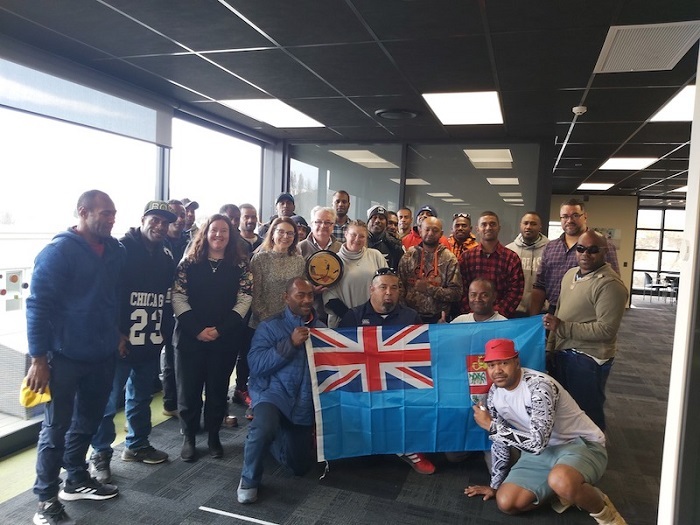Increase in RSE workers welcomed
Anna Robb
19 October 2022, 5:00 PM
 Seasonal Solutions Cooperative Ltd chief executive Shaun Fogarty and operations manager Ieremia Lemuelu caught up with some RSE families and dignitaries in Vanuatu and Fiji in August
Seasonal Solutions Cooperative Ltd chief executive Shaun Fogarty and operations manager Ieremia Lemuelu caught up with some RSE families and dignitaries in Vanuatu and Fiji in AugustCentral horticulture and viticulture businesses will have a bigger seasonal workforce than in previous years since the government added 3,000 places to the Recognised Seasonal Employer Scheme (RSE), bringing the national total to 19,000 workers.
Many RSE workers from pacific countries such as Samoa, Tonga, Solomon Islands, Kiribati, Vanuatu and Fiji provide around seven months of labour during the busiest time in the run up to harvest and during harvest.
Seasonal Solutions Cooperative Ltd (SSCO) chief executive Shaun Fogerty said the increase in the cap was welcomed.
“What was asked for was provided and it has pleased growers down here,” he said.
SSCO will not divulge the numbers of extra workers coming to Central this season due to commercial sensitivity but Shaun said it was a “proportionate increase this year” above the usual 600 RSE workers who come to the region.
The new cap was settled on a tripartite basis for the first time, with both employer groups and unions at the table, enabling a discussion about both the number of workers, and how to ensure good employment practices.
In setting the cap, the government has also taken into consideration concerns by RSE workers about working conditions.
Immigration Minister Michael Wood said the wellbeing of RSE workers is a priority. The government is introducing a new sick leave entitlement to RSE workers in addition to the pre-existing minimum wage requirement of $22.10, which was introduced during the pandemic.
“We continue to work urgently with the industry and unions on further short-term improvements and employee safeguards to provide greater protections to workers,” Michael said. “This work is in addition to our wider policy review to improve the RSE scheme for workers, as previously signalled.”
“We recognise the important role the RSE scheme provides to our nation’s primary production sector and wider economy. We are committed to working with industry and unions so we can continue to maximise benefits of the scheme for Pacific workers, local employers, and our Pacific neighbours.”
Shaun said accommodation of the new RSE workers was “a real focus” for SSCO and they are working closely with shareholders and growers on the issue.
“Despite what recent media attention is all RSE accommodation is approved by the directorate of labour under [Ministry of Business, Innovation and Employment].”
He said certification and approvals covered the size of rooms, number of showers and laundry facilities per person along with rent payable including utilities such as gas, internet, water and electricity.
“We were really disappointed to hear some employers elsewhere in the country aren’t up to standard. Seasonal Solutions is the oldest and largest provider of RSE workers… and we really pride ourselves on looking after people.”
A new SSCO initiative for this season in partnership with Central Otago District Council (CODC) is the Manaaki Group, which has a pastoral care focus.
The group is made up of representatives from RSE workers, growers, Welcoming Communities, the local police, and the Ministry of Social Development.
The group is regularly meeting and planning training and connection activities for Central’s RSE workers; such as a regional soccer tournament, cooking classes, and their involvement playing music in the Blossom Festival parade.
Check out this video of CAJ Hollandia’s RSE crew playing music in the 65th Blossom Festival Parade.
Shaun said SSCO closely monitors pay rates, with some of their workers earning in the high 20s, “well above minimum wage” and pre-Covid-19 they had a return rate of around 80 per cent for their RSE workers.
“That might be around 60 to 70 per cent at the moment.”
He said what they earn in Central over a seven month period would take them around four years on an average wage in Vanuatu.
“The first year or two they’re paying school fees for kids and building houses… then it's assisting with developing businesses and buying vehicles.”
The lower current return rate is not a concern as Shaun said “you want to share the love” with other families in the Pacific having the opportunity to earn in New Zealand.
Fifty RSE workers are arriving this week, a contingent from Fiji arrived two weeks ago, and the balance will be in Central in November.
Shaun said the broader community can help them settle in by being friendly and giving them a wave.
“They contribute hugely to our economy every year.”

RSE workers from Fiji arrived in New Zealand a few weeks ago for the busy season
Seasonal Solutions Cooperative Limited (SSCL) is a grower and contractor owned cooperative which has been operating since 2004 and supports orchards and vineyards in Central, Marlborough and Canterbury.
It is the largest and oldest RSE employer in New Zealand. There are around six other employers of RSE workers in Central.




